
Tuesday, May 27-Thursday, May 29 S.D. Jewish Arts Festival
Wednesday, May 28 JFS~Ellen Saks lecture on mental illness


Tuesday, June 3 Guardians Golf & Tennis Tournament


Thursday, June 5 Tifereth Israel's 'Girls Night Out'


Friday-Saturday, June 6-7 JFS~Judaism on the Wild Side


Sunday, June 8 Temple Solel~Tikkun Leil Shavuot


LETTER FROM JERUSALEM
Are peace talks Olmert's diversion?
By Ira Sharkansky
 JERUSALEM—There is a great scandal brewing here, but at least some of the implications are not as frightening as they seem. JERUSALEM—There is a great scandal brewing here, but at least some of the implications are not as frightening as they seem.
The scandal concerns police investigations and potential criminal charges against Prime Minister Ehud Olmert for deception, dereliction of duty, violation of trust, money laundering, tax evasion, and perhaps bribery. We are some way from a formal indictment, but serious reports, as well as leaks and speculation suggest that this is the most serious investigation of the five or six that have been waged against him in recent years. Political rivals within and outside his party are circling like vultures who scent rotting meat, and positioning themselves to do battle both with the prime minister and with one another.
Most prominent of the fears is that Prime Minister Olmert is selling out the country in order to keep the police at bay. Behind those fears are his announcements that a sort of peace agreement with the Palestinians of the West Bank and a cease fire with the Palestinians of Gaza are within reach, and that peace talks are underway with Syria, via Turkey, that can result in painful concessions.
The timing of these announcements is suspicious, to say the least. It is difficult to find a commentator who is not cynical about the prime minister's throwing himself a life preserver, or willing to make concessions opposed by considerable segments of the population in order to save his job. Reports are that Olmert is preoccupied with the criminal investigations, and cannot devote the time and energy necessary to the public's business. Even politicians in favor of concessions for the sake of peace with Palestine and Syria are wondering how much of the news is "spin" for the sake of Olmert's skin, and how much reflect serious efforts that can be pursued by Olmert's successor. Politicians and commentators from numerous camps are saying that it is time for Olmert to take a vacation or resign, so that someone else can manage serious issues without the hint of doing so for the sake of self-interest.
The prime minister also has prostate cancer, and may also be forgiven some time and energy to ponder various treatment options. Cynics did not hesitate to describe a recent announcement of his undergoing further tests as yet another effort to distract attention from the police investigations, and to gain public sympathy.
Commentators and political rivals are within their rights to question the timing of peace initiatives. Yet fears of the prime minister selling out the country are premature. Several features of the Israeli government, as well as complications in the peace initiatives help to soften those fears.
- The Israeli government and its bureaucracy are not beholden to the prime minister to the extent that he can do what he wants. The police and the public prosecutor have sufficient independence, as well as professional integrity to continue with their investigations.
- Israeli media are independent and aggressive. If anything, they may be too inclined to serve whoever in the police or the prosecutor's office in inclined to leak details in order to stain the image of someone in the political elite currently under investigation.
- Olmert is not conducting negotiations with Palestinians or Syria by himself. His aides may be beholden to him, but they also have their concerns for professional integrity and for whatever opportunities might be available if Olmert is forced out of office.
- The Israeli government is never entirely in the prime minister's pocket. Competitive parties sit in the government coalition. The leaders of those parties have their own interests, as well as rivals within their parties nipping at their heels if they seem to be following too closely the wishes of a prime minister (especially a prime minister who may be on the verge of ouster).
- Olmert's own party is not monolithic. There are at least four senior members, all of them ministers in his government, who see themselves as potential replacements. Each has expressed at least guarded comments about the problems of the prime minister, and about the appropriateness of waiting to see the outcome of police inquiries.
- Settlers on the Golan are in full fever, organizing with their allies in the right-of-center political parties and religious Jews who read the Bible to indicate that the Golan is within the Land of Israel, and not the property of the present generation of Jews--or any future generation--to give away. Secular skeptics, among them archaeologists, read the Bible as Jewish hyperbole. In their eyes, David's empire may have been no greater than a dusty acre or two outside the walls of Jerusalem's Old City. Nonetheless, the Bible is one of the stimuli that fuels opposition to any deal that would surrender the Golan.
- There is no indication that Olmert is giving away the shop in his dealings with the Palestinians of the West Bank or Gaza, or with the Syrians. The best indications are comments of Israel's adversaries.
- Palestinians of the West Bank involved in negotiations periodically state that there has been no progress, or insufficient progress. The president of the Palestine National Authority, Mahmoud Abbas, has threatened to resign due to the lack of Israeli concessions.
- Palestinians of Gaza have recently indicated that Israel has not accepted their terms for a cease fire, and that they cannot accept Israel's counter-demands. On the morning that Hamas announced its rejection of Israeli conditions, one of the Gaza factions exploded a heavily-loaded truck bomb near one of the transfer points for shipping food, fuel, and other supplies from Israel to Gaza. Aside from making a great noise, breaking windows within a radius of several miles, damaging the transfer point, and blowing the suicide driver to his or her paradise, the bomb accomplished nothing more than causing one more suspension of shipments into Gaza.
- Even on the first day of announcing conversations, Syrians are saying that they cannot begin until Israel categorically concedes all of the Golan. They insist that this demand is not a precondition for negotiations, but their natural right to their own territory. Such comments suggest that Israel has yet to make categorical concessions. If Israel demands that Syria abandon its close ties to the terrorists of Iran, Hizbollah, and Hamas as a condition of peace, the negotiations may drag on through the careers of several future prime ministers.
Israelis may be right in being ashamed of their prime minister on account of repeated allegations, and mounting evidence against him. Those who fear him are exaggerating his power and influence.


FROM THE GATES OF THE NEGEV
Israeli mayors neighboring Gaza demand Israel's goverment stop the terrorist rockets
By Ulla Hadar
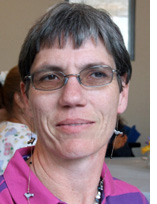 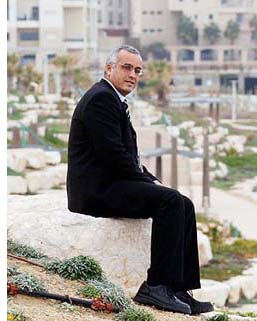 KIBBUTZ RUHAMA--Last week a Grad rocket fired from Gaza wounded and injured many citizens and caused considerable damage at a the popular shopping center by in Ashkelon, KIBBUTZ RUHAMA--Last week a Grad rocket fired from Gaza wounded and injured many citizens and caused considerable damage at a the popular shopping center by in Ashkelon,
This event led to a meeting of the leaders of six municipalities encircling the Gaza strip. Ashkelon Mayor Roni Ma'azri (in Gadi Kabalo photo at right) hosted Mayor Alon Schuster of Sha’ar Hanegev, Netivot Mayor Yechiel Zohar; Sderot Vice Mayor Oren Malka; Hof Ashkelon Mayor Yair Fargune; and Sdot Negev mayor Meir Yfrach.
A decision was made to approach the Israel’s nationalgovernment with a demand to stop the rocket fire, by all means and ways.
Furthermore the mayors decided to launch a public relations campaign to provide Israelis with a better understanding of the situation facing the area neighboring the Gaza Strip.
Ma'azri mentioned that the national government several times had plans to invade the Gaza strip but because of the expected loss of soldiers this might cause, postponed such action again and again. So instead of the army being a shield to the population, the people of the South are acting as a shield to the army, he commented
Schuster made it clear that the demand from the municipalities to the government should only be for the elimination of the rocket attacks and that whatever action is taken should be concluded in a very short time.
There is a price to whatever the government choses to do, but it is important to decide what to do, Schuster said. The moment the population realizes that the government has decided upon a course and has acted upon it, the strength and the morale of the people will grow.



ARTS IN REVIEW
A Jewish rendezvous in Canada
By Carol Davis
 OTTAWA, Canada—When my very dear friends Debbie and Steve Luce moved to Ottawa, Canada, for Steve’s last tour of duty for the Navy two and a half years ago, the expectation was that I would be visiting them in the near future. Two years later, the near future finally came OTTAWA, Canada—When my very dear friends Debbie and Steve Luce moved to Ottawa, Canada, for Steve’s last tour of duty for the Navy two and a half years ago, the expectation was that I would be visiting them in the near future. Two years later, the near future finally came
Where to begin?
We could trash the airlines; the hurry up and wait mentality of it all, but that would be old news and my pressure would be off the charts, so we’ll move on to the destination; the reason for the trip and the wonderful sights, sounds and impressions.
My journey took on many facets, to say the least. Firstly, I went to visit dear friends. Debbie and I go way back, both being Jewish theater devotees. She is a performer and an equity stage manager, having worked at our own Starlight for the past several summer seasons as well as at the School of Creative and Performing Arts when she and her family lived in San Diego. While she is both the performer and behind the scenes person, I write about what happens when the curtain goes up, so we always have a lot of notes to compare.
Steve is career Navy having spent time in the Gulf War flying one of those whatever jets and serving as air boss of the USS Constellation among other deployments. Presently, he is the Naval Attaché in Canada, ergo Ottawa.
Steve is also a staunch supporter of the performing arts. Being married to Debbie, and with both their grown sons having attended the School of Creative and Performing Arts and with their youngest, Jeremy, now the lead carpenter at the Tulsa Oklahoma Light Opera this summer, it’s pretty much in his blood as well. The three of us have enjoyed many shows, holidays and simchas over the years both in San Diego and on several other of his duty assignments.
Another important decision for making the trip was a chance to visit both the Stratford Shakespeare Festival in Stratford, Ontario and the Shaw Festival in Niagara on the Lake, both of which I will tell you about. Lastly, I always make a point of visiting or at least checking out the local synagogues, areas and or museums to get a flavor of the Jewish community, make a connection and gather an understanding of the complexion of that community.
In fact, while I was gone, a friend in San Diego e-mailed me information on the Jewish Film Festival in Toronto, but it did not coincide with my itinerary. Would that I were there long enough to see at least one of their choices, but when on holiday, one uses the time to do as much as possible knowing full well that some things can’t get done. That said. I was fortunate enough to have had the opportunity to meet some interesting Jewish movers and shakers on this trip.
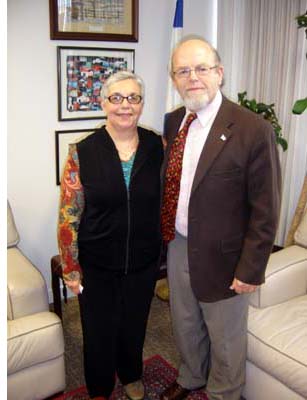 Steve, on my request, made arrangements for me to meet with the Ambassador of Israel to Canada. Since my oldest daughter and her family made Aliyah ten years ago, I thought, “Why not?” Ambassador Alan Baker (pictured with me, at right) afforded me a good half hour to visit with him. We compared notes about our children and my experiences in Israel on my several trips there. We talked a little about the Jewish community in Canada, places we had in common in Israel, what my plans were during my visit in Canada and my work as a journalist for San Diego Jewish World. It was pleasant and I felt most honored to have that privilege. Steve, on my request, made arrangements for me to meet with the Ambassador of Israel to Canada. Since my oldest daughter and her family made Aliyah ten years ago, I thought, “Why not?” Ambassador Alan Baker (pictured with me, at right) afforded me a good half hour to visit with him. We compared notes about our children and my experiences in Israel on my several trips there. We talked a little about the Jewish community in Canada, places we had in common in Israel, what my plans were during my visit in Canada and my work as a journalist for San Diego Jewish World. It was pleasant and I felt most honored to have that privilege.
Through other Jewish friends of Steve and Debbie, we had also arranged to meet with Bernie Farber, CEO of the Canadian Jewish Congress in Toronto where now Debbie and I were to begin the next phase of our journey. We left Steve to attend to his diplomacy promising to come home with all kind of tales.
Before we left however, we did take in the Canadian Tulip Festival which occurs every year in Ottawa. This year it took place from May 2nd to May 19th. Unfortunately the cold weather this year put the blooming off for at least a week. So many of the tulips we saw were mere buds, but around the city they were in beautiful full bloom. During those two weeks of the Festival a gorgeous tent brought in from Belgium by Alex Meder and Magic Mirrors called The Tulip Festival Mirror Tent is put together. On May 10th it hosted The Tulip Ball. I got a chance to see the inside as they were putting the finishing touches together.
That same day a visit to the By Ward Market, a quaint shopping area filled with street vendors selling everything from flowers to clothing to food all made or grown locally, was in order. We stopped and had a Beavertail, a pastry Debbie convinced me I couldn’t live without tasting. It’s a flat, fried piece of dough sprinkled shaped like (you guessed it) a beavertail with any topping you chose. We just had brown sugar and cinnamon but the calories were there anyway. No one can accuse me of not tasting the flavors as well as taking in the scenery of the locals. I did follow up with a locally grown apple.
After a tour of the American Embassy and a reception by the Polish Attaché with some amazing dancers as entertainment we headed for home to pack to continue on our trip to Toronto and Stratford early the next morning
In Toronto, we met and chatted with Bernie about the conditions of the Jewish Community in Canada and Bernie’s passion for bringing all communities to the table to resolve any or all dissension toward the Jews in Canada. We also talked about anti Semitism which I had read earlier was on the rise in Canada. True or not, we did touch on it and he talked about his eagerness to bring all parties to the table and discuss commonalities rather than differences. I thought this was a novel approach.
Bernie is an eternal optimist and continues to work toward more unity in his community. Of course we talked about food, theatre, my trip and the Arts as well. The next time you see me, ask me about our stop at Wolfie’s Deli (‘and don’t ask for lettuce or tomato on your sandwich ‘cause we don’t have it’) on Sheppard Ave., Bernie’s favorite lunch place.
By the way, Bernie’s story can be found on the San Diego Jewish World website .. Our fearless editor, Don Harrison, had him in his scope long before I met either Don or Bernie and both are still championing their same causes. When we left Bernie’s office, we strolled down the corridor of his building to the ‘Holocaust Center of Toronto’.
The exhibit “We who survived” is a loving and touching memorial to those both living and those who perished in the camps. It is a permanent “interactive exhibition of contemporary portraits of Holocaust survivors, autobiographical sketches, archival photographs and documents.” Eighty individual stories are recorded in the museum. These survivors educate and inspire thousands of students from across the continent. As you pass through the hall to the museum, pictures displayed along the wall show the survivors then and now, their families and their documents by way of sliding frames. It’s the first of this type of exhibit I’ve seen in my travels and puts a different perspective on the past and present.
As a side note, my oldest grandson who will be a senior in high school in Israel next year will be joining other high school youngsters in The March of the Living. They will be traveling to Poland to see the camps first hand. I can’t wait to hear of his impressions.
As mentioned earlier, whenever I visit another state, country or community where they may have a Jewish or Holocaust Center, I take pains to see and bear witness to ‘man’s inhumanity to man’ lest we forget. I never leave dry eyed. The ‘first world class Holocaust museum in Canada’ is in Montreal but we never made it there.
The Toronto center also serves as an educational forum. We visited the library just across the hall and on a lighter note; we played Jewish Geography with the librarians, one of whom also has children living in Israel. We browsed through some of the reading material on the shelves said our goodbyes and headed out to Stratford to begin our theatre journey and then some!
Theatre, sightseeing and impressions will be continued in the next installment.
See you at the theatre.


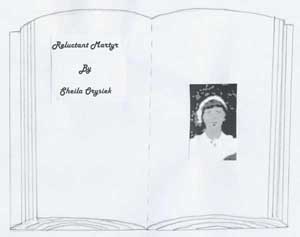 Editor's Note: This is the ninth chapter in our serialization of Reluctant Martyr, a historical novel by our columnist Sheila Orysiek. It is based on the experiences of her aunt. In each Friday-Saturday edition of San Diego Jewish World, we will run another installment of the 21-chapter book until its conclusion. We thank Sheila for granting us first publication rights to her book. Comments are welcome at sdheritage@cox.net Editor's Note: This is the ninth chapter in our serialization of Reluctant Martyr, a historical novel by our columnist Sheila Orysiek. It is based on the experiences of her aunt. In each Friday-Saturday edition of San Diego Jewish World, we will run another installment of the 21-chapter book until its conclusion. We thank Sheila for granting us first publication rights to her book. Comments are welcome at sdheritage@cox.net
Chapters 1 2 3 4 5 6 7 8 9 10 11 12 13 14 15 16 17 18 19 20 21
Reluctant Martyr—Chapter Nine
State Street and 40th Street run parallel to each other and are connected by Cambridge, which like the others is old, narrow and lined with red brown brick shops and houses. Occasionally, the first floor of a house had been turned into a small shop, while the family lived either in the back or on the floors above. On Cambridge, the shoemaker, a small but powerfully built German immigrant, had his store in just such a converted house. Pieces of leather of all kinds and colors hung from hooks in the walls near his two large sewing machines. Metal shoe forms of various sizes stood about and the entire shop was permeated with the odor of leather and shoe polish. A bell on the door clanged when it was opened and the shoemaker would look up over his thick eye glasses and come out from behind one of his machines to tend to business. Adolphe Gutmann waited on his customers with as few words as possible, and no one had ever seen him smile. He did all the work himself. After completing each pair of shoes he carefully cleaned and polished them and set the shoes in his front window so that everyone could see his good work.
Every evening he emptied the drawer of his large old cash register, pocketed the money, locked up the store and disappeared down a hall into the living quarters. Only rare glimpses had ever been seen of his wife. After supper he locked her in the house and walked down Cambridge Street and turned right on 40th to the saloon on the corner near the park.
Maya Zunge had been right, business was not as good as it had been. The country was sliding deeper into depression and many more people had lost their jobs. They spent the little money they had on absolute necessities and a hole in a shoe sole could wait. A folded piece of newspaper placed strategically in the shoe would do for a while. One particular day, late in the afternoon, as Jahn Perris was on the way home from his office, he stopped at the shoemaker’s shop to drop off the finished bookkeeping.
“Mr. Gutmann, good afternoon to you!” Jahn said cheerfully, as he stepped into the shop.
The shoemaker came from behind one of the sewing machines, adjusted his glasses and took the account papers from Jahn. “Mr. Perris,” he began, and then cleared his throat, “this is the last work I can give you.”
“Is my work not satisfactory?”
“No, it’s not your work,” the shoemaker answered, coughing yet again, “the business is not good....as you can tell from my books.”
“Times are bad, I know, Mr. Gutmann. I hope they will get better for you...for everybody. Good luck to you.” Jahn walked out of the door as the shoemaker, a man of few words, bent again to his machine. Unfortunately for Jahn it was the beginning of a trend.
Not everyone suffered equally from the depression. Uncle Joseph did have to let go a few of his window washers, but his business continued profitable. He had over the course of time expanded it into many other neighborhoods and even into the downtown business sections of Philadelphia. Every year, without fail, Nora and Joel spent the summer at the Atlantic City shoreline in New Jersey. She rented a nice cottage on the beach and the days were whiled away in shopping and gossiping with friends. Occasionally Joseph joined them for a weekend. Nora did not want to hear about the depression, it bored her. She was not at all interested in the nuts and bolts of how Joseph earned their living, as long as the money came in.
Yarosh and Sofia continued to do well at the newspaper stand they owned at the foot of the elevated stop. Even in a depression people still needed to buy a paper to search out the want-ads. Sofia manned the station for twelve hours during the day and Yarosh for twelve hours at night. They must have had some time off, however, as Sofia was expecting their first child.
The candy store on the corner of State Street was one of those businesses that were not doing as well as previously; the children didn’t have as many pennies to spend. On the corner, outside the shop, around the light post, could now be seen a growing knot of unemployed men, not sure of what to do next. The Irish family was particularly hard hit. The father had been jobless for months and finally in panic he left home, and the mother had eight young children to feed.
As events progressed, Jahn reluctantly had to tell Hannah that the work he did was slowly drying up. One evening after Sharona and Etah had gone to bed and Hannah was in the parlor hemming a skirt, Jahn sat down in his favorite chair beside the sofa. “Hannah,” he began, keeping his voice very low, “you know many more people are out of work; every day more and more.”
“I know, I hear it on the radio. The Italian man down the street...with all the children...he lost his job. His wife told me today.”
“It’s not only workers, but also businesses. If people are out of work they can’t afford to buy things.”
“It’s a shame. I feel sorry.” Hannah shook her head as she continued to sew.
“If businesses, especially small shopkeepers are not doing well, then they don’t want...don’t need...to have someone...me...do their bookkeeping. They need to save every penny.”
She looked up from her work. “So, what are you telling me?”
“We need to be careful with our money.”
“I am careful!”
“I know, I know!” he assured her. “Still every cent must be counted. I’m not sure how long...or what will happen.”
Now the daily trips to the food shops on 40th Street were not so much social outings, as serious attempts to stretch the food money ever further. Behind his cash register Mr. Becker kept a list of customers and how much they owed him from week to week. The housewives watched the scales very closely when he weighed the food and every noodle was counted.
Finally the day came when Jahn went to his office for the last time. The table and chair had come with the room so he picked up the radio and lamp which belonged to him, and closed the door. He walked the few blocks home carrying these items and it seemed his hopes had been left behind. From now on the dining room table would suffice for the work he still had. In his characteristic gesture when he was tired, he took off his glasses, the ones with such delicate wire frames, and covered his eyes with his hand. This happened more and more often.
Hannah felt Jahn’s despair at this visible decline in their fortunes. Though he was one of many who suffered at this time, she knew he took it personally. She knew also his pride was hurt and she tried in every way she could think of to let him know she still loved him. Their financial problems could not alter that.
...............................................
 After completing the third grade, Etah was skipped to the sixth in a further effort for her to catch up to her age peers. She was a good student but lately her grades had slipped. The family grew concerned and Sharona told her she must study harder. “I don’t think you are paying attention in school!” her mother said. After completing the third grade, Etah was skipped to the sixth in a further effort for her to catch up to her age peers. She was a good student but lately her grades had slipped. The family grew concerned and Sharona told her she must study harder. “I don’t think you are paying attention in school!” her mother said.
“I am! I....”
“Look at these grades,” Sharona complained as she pushed a report card toward Etah. “How do you explain that?”
“I don’t know. I try, I really do!”
“Maybe if you did more homework.”
“I do all I’m.....”
“It’s no use,” Hannah interrupted, “she doesn’t care.”
Jahn looked up from his books and he noticed the child leaning abnormally close to her book on the table. Hannah noticed too, and shouted at her, “Etah! Sit up straight! A young lady must have good posture.”
The child burst into tears and through her sobs, she cried, “If I sit up I can’t see my book!”
Jahn asked her, “How close do you have to be to see the words clearly?” She leaned forward until her nose almost touched the page. “Can you see the blackboard in school?” he wanted to know.
“No,” she sobbed, “and I get everything wrong!”
“Well,” Jahn said, “she probably needs glasses. It’s not her brains; it’s her eyes that need help.”
A perceptive teacher at school had noticed it too, and the very next day Etah brought home a note from the school nurse that said her eyes had been tested and she was severely nearsighted. But, solving that riddle only led to another; what to do next. Hannah and Sharona walked to school a couple days later and explained to the school nurse with much embarrassment that they could not afford to go to an eye doctor.
“I am Hannah Perris,” she began, “Etah’s sister. How do you do? This is my mother and we.... Etah brought home a note about her eyes. And that she needs $3.00.”
“Well,” the nurse said, “the child cannot see. We’ve tested her eyes and she’s very nearsighted.”
“And the $3.00?”
“The school has a program where we can supply her with glasses for $3.00.” The nurse saw them hesitate and hastily confer in Yiddish. “Is there a problem?” she asked.
“The $3.00....”
“That’s much less than it would be if you went to a doctor.”
“Ah yes, I’m sure....thank you. But when do we need the money?” Hannah asked.
“As soon as you give it to me I’ll order the glasses and then it’ll take a couple of weeks.” The nurse looked at them sympathetically. “I know these are hard times and $3.00 is a lot of money for some families, but it is the best I can do.”
“I’m sure, thank you very much.” Hannah paused and then said, “We will get the money for Etah. But it ....as soon as possible.” Sharona added her smile and nodded at the nurse, her English still too unsure.
After supper that evening, as Etah bent over her school books, the adults discussed the problem in whispers as they sat in the parlor. “Well, she has to have glasses,” Jahn said. “She can’t see.”
“Where will we get the money?” Hannah wanted to know.
“Make more noodles for supper,” he suggested. “If every week we manage to save 75 cents we’ll have it in a month.”
“I will stop buying the Yiddish newspaper,” Sharona declared. “Hannah can read to me from your English paper.”
“Mother, that’s only five cents!”
“So. Five cents is five cents! Then we will only need 70 cents from each week.”
Before going to bed that night Hannah lifted the cushions off the parlor furniture and putting her hands in the upholstered spaces of the sofa she found a dime that at one time must have slipped from a pocket; a dime toward Etah’s glasses.
Two weeks later Passover was celebrated on a gorgeous day in April, a day that gave promise of the glories of summer to come. Leaves and buds and kittens couldn’t wait to be born. As sunset drew near the entire family prepared to meet at Uncle Joseph’s home for the Passover supper. Aunt Nora adored having the neighbors see her entertain for the holidays. She put a great deal of thought into planning the meal and setting the table and she bustled about the food shops with more than her usual pizzazz. At least it seemed so to all of the housewives who stood at the store cash registers and slowly counted out their money. Aunt Nora didn’t mind them at all.
All day Hannah, Sharona and Etah had debated over what to wear.
They didn’t really have that great a choice, but pretending was delicious. Hannah dressed with her usual care; she was meticulous about how she looked. Her clothes were never wrinkled and no matter how old the dress, she always managed to make it look interesting. Her hair, too, was never out of place and the dark curls that framed her face were thoughtfully arranged.
 Hannah insisted that Etah’s hair should be set with a hot curling iron though the younger sister protested she was too old for this particular hairstyle. “I don’t want my hair in ringlets!” Etah told her Hannah. Hannah insisted that Etah’s hair should be set with a hot curling iron though the younger sister protested she was too old for this particular hairstyle. “I don’t want my hair in ringlets!” Etah told her Hannah.
“You’ll look like Shirley Temple!”
“I’m too big for that....NO!”
“You are so stubborn! I want you to look nice!” Hannah waved the iron back and forth.
“Mother!” Etah called in despair, “Tell Hannah...”
But her mother’s voice interrupted her, “You do as your older sister says, she only wants the best for you!” Hannah smiled exultantly.
Jahn put on his only suit and carefully placed his skullcap in the jacket pocket. Hannah put on her pearls. Each woman placed a scented handkerchief in her purse that Hannah had embroidered. From out of the sideboard, carefully wrapped in heavy cloth, Sharona took the Russian silver; the wine cups and the silver tableware. The stemmed silver goblet would be used for the Prophet Elijah, that they hoped would visit their table and sip some wine. The cares and gloom of the worsening financial times were momentarily put aside as they stepped out of the house into the still lingering sunshine.
It was only a short walk to Union Street. Hannah and Jahn walked arm in arm and a step or two behind, Etah had her hand linked in her mother’s arm. Sharona firmly held the wrapped silver against her body. Though the neighborhood was by no means entirely Jewish, enough Jews lived there so that everyone was aware of the holiday. Passover and Easter usually come closely together and so the community as a whole was in a fairly festive mood.
Joel greeted them at the door, Aunt Nora was busy with the last minute preparations in the kitchen and Uncle Joseph was struggling upstairs with his suit and tie. Shortly after Yarosh and Sofia arrived everyone gathered around the large dining table. Nora had covered it in her best snowy white cloth and in the center was the traditional Seder plate filled with the symbols of the holiday. Sharona put a silver wine cup in front of each place and added here a fork and there a spoon or knife by each plate. There was not enough of the Russian silver to make all the place settings complete, so each person got one or two pieces. It represented a continuum of a holiday celebrated from one year to the next, from one country to another, from generation to generation.
The cups were filled with wine and the silver stemmed goblet, too, which was reserved for the visiting Prophet. Aunt Nora lit and blessed the candles. Uncle Joseph recited the story of the holiday and Joel asked the four questions tradition required a young son to ask. As the prayer for the wine was recited the wine cups were raised. “Joel,” his father said, “please go open the front door.”
“What for?”
“To let the Prophet Elijah in.”
“I do this every year and I haven’t seen him yet!”
“Angels can’t be seen, son.”
“We are inviting him in to have a sip of wine with us.” Jahn explained.
“I’ve never seen that either,” Joel replied. “And besides if he goes to all these houses won’t he be drunk afterwards?”
“Joel! Open the door!” Uncle Joseph insisted. Joel stopped arguing and went to the front door and everyone was hushed as it was hoped the Prophet would visit them this day.
Yarosh arose from his chair. “And now I would like to propose a toast.” Everyone turned toward him, a bit surprised as he seldom actively participated. “A toast to my wife, Sofia...and the child she is bearing!”
“Wonderful!” Uncle Joseph shouted.
“Mazel Tov!” everyone said as they rose and offered up their cups and drank.
“My cup is empty, father,” Joel complained.
Uncle Joseph refilled it. “Sip it, Joel, don’t gulp!”
Joel rolled his eyes, “It’s so good!”
It must be admitted that the family did not spend a great deal of time on prayers; they were much more into singing. The young voices of Etah and Joel rose clean and clear, the men had a lower growl and the women’s voices a quavering soprano. Between songs Aunt Nora and Hannah brought in steaming platters of food and the joy of eating began.
“And when is the baby due, Sofia?” Nora asked.
Sofia blushed as she answered, “In about five months.”
“So of course you’ll no longer work at that newsstand,” Nora said. “I never thought it was a place for a woman anyway.” Sofia kept eating and didn’t answer. But Nora was not to be denied. “Have you quit already?”
“I’m looking for someone to hire,” Yarosh explained.
Nora handed around more bowls of food. “I always felt so sorry for you to have to work like that.” She then checked everyone’s plate to make sure that in her estimation they were filled sufficiently. No one would leave HER table hungry. Finally, they were all stuffed with food; belts were loosened and chairs pushed back several inches from the table.
“Another great meal, Nora,” Uncle Joseph smiled at her. Aunt Nora puffed out her cheeks in pleasure.
“Yes, yes, wonderful!” everyone chimed in.
They did not spend a great deal of time on prayers after the meal either and instead reverted shamelessly to a favorite pastime; playing cards. They never played for money, but it was spirited nonetheless. They played an old Russian card game called “Durok,” loosely translated as “fool.” There had always been in Sharona a bit of the quality of a tease, a mischievous elf; an imp lurking somewhere inside and waiting to come out. She could never quite play the game straight; in fact, she blatantly cheated! She had been known to drop unwanted cards into her lap or pretend she only had four cards when in actuality she had five. Everyone else played the game honestly and Sharona found that boring, a little friendly cheating would liven things up in her opinion. The family had resigned itself to this blemish in her character, though outsiders were horrified. Everyone, however, ended up laughing uproariously. Though Hannah laughed too, she always felt embarrassed by her mother’s high spirits and this, added to the sin of playing cards on Passover, was too much for her sense of propriety. She cringed inwardly but she never even thought of voicing this complaint to her mother. Disrespect was another sin she would feel guilty about.
At one particular lull in the merriment, Joseph looked over at Etah and saw she had her cards up to her nose. “The mother cheats, and the daughter smells them!” he announced.
Sharona’s smile vanished and she turned to him and said, “Joseph, she is having trouble seeing.”
“So,” he responded, “take her to a doctor and get her glasses.”
“The school will be getting them for her, but we have to wait a while,” Sharona explained.
“Why wait?” he asked.
“Because,” Etah interjected, “it costs $3.00.”
The table was hushed. Aunt Nora puffed her cheeks. Hannah looked embarrassed and Yarosh firmly studied his cards. Yarosh and Sofia left shortly thereafter, and the men went into the parlor while the women spent the rest of the holiday evening cleaning up the kitchen. Later Uncle Joseph found Sharona’s purse lying on a table and taking $3.00 from his wallet he slipped it inside.
The next day, after this incident, as Etah walked by the front bedroom, Hannah took her roughly by the arm, pulled her inside and closed the door. “I’m so ashamed of you! How could you embarrass us all like that last night?”
Etah looked at her sister in innocent surprise. “What did I do?” she asked.
“You know very well what you did! Going around telling everyone we can’t afford $3.00 for your glasses. People don’t have to know. Everyone will think we don’t love you.”
“Uncle Joseph asked.”
“You don’t tell anyone things like that! It’s like begging for money. Never say....”
“I just answered his question because...”
“Never say,” Hannah repeated sternly, “we need money, no matter what!”
“But Uncle Joseph gave mom the $3.00 and now I can get the glasses and....”
“That’s not important! What is important is what it looks like.” Etah pulled away from Hannah and ran from the room crying.
................................................
On 40th Street next door to the saloon, where Mr. Gutmann spent so many of his evenings after fixing shoes all day, was the neighborhood laundry. Few people had even rudimentary washing machines, especially in rented homes. Cellars were for coal furnaces and piles of coal, ash cans and storing the snow shovels. Where would a washing machine go and why invest in plumbing in a rented house? Instead the family laundry was carried down to a commercial establishment and was washed, folded, ironed and came back wrapped in blue paper.
Hannah and Sharona always washed out by hand the underwear and other small things and this was hung on a makeshift line in the bathroom. Outside in back of the house there was a tiny weed choked spot with a laundry pole but it never occurred to them to shamelessly hang out underwear, especially female underwear. All of the larger items, sheets, tablecloths, dresses and shirts went to the laundry. But times were getting harder in that household and sending clothes out was an expense they could no longer afford. So, a wooden scrub board was propped up in the bathtub and both women, but mostly Sharona, labored on their knees at this chore.
The women of Philadelphia were a dauntless group and their mettle was tested regularly when hanging out the wash. In the summer the blazing sun and simmering humidity were their enemies. On a lovely spring day a sudden rain shower would bless the clothes just as they had been pinned up and then the rain would stay only long enough to spatter them with a splash back of mud. In winter the clothes were often frozen before they had dried. And, those were the days when it was not actually raining.
The difficulty of washing by hand a large sheet was exceeded only the effort required in wringing it out. It was not a task for small, delicately made feminine hands, and yet these were the hands that did it. The washed items were piled into a basket that had to be hurriedly carried down from the upstairs bathtub to the first floor and then down another flight into the cellar and out the back door. It was important to run down the steps and through the house as quickly as possible because as well as the laundry was wrung out, it still dripped through the basket. This vital run and the hanging of the clothes were Etah’s tasks.
On a blisteringly hot day, made worse by visible humidity, Sharona was on her knees bending over the tub, washing and wringing the sheets and towels for the week. Etah struggled with the heavy basket loads of wash, running down the flights of stairs, through the house and out the cellar door. She hung each piece as the sun bore down on her head and just as she completed pinning it all up and was aching for some shade, the heavily laden laundry pole decided to die and fell over. Etah and Sharona cried at the sight. Hannah had a headache and was resting.
While the women of the house wrestled with the wash and other such chores, Jahn spent his days looking for new accounts or any odd jobs. He seldom found either. Jahn was by no means lazy but his was not a truly competitive nature. He had more the soul of a poet, a quiet man, and rather introspective. He was not a dreamer, his dream of playing and making music had long since vanished. He walked the pavements, a small piece of newspaper in his shoe over the hole at the bottom, and hoped against hope for a day’s work. At night he did the bookkeeping for the few accounts he still had left.
After such a day, he came home tired and hungry. Sharona, having learned well during her time as a refugee in Romania, saw to it that absolutely not a bit of food was wasted. Potato peels, celery tops and bones became soup. Jahn’s step was heavier these days and his face grew haggard. They could all see his tiredness and frustration and between them they saw to it that he got most of the food. There was very little on the other plates and sometimes the women ate nothing at all and told him they had eaten earlier. Etah, no longer a child, played her part, too.
It was hard for Hannah to watch Jahn’s growing depression and she was anxious about his health. She combed through her mind for ways she might help him, but aside from her sympathetic presence, she felt powerless; though she never considered working outside the home herself. As for Sharona, she was more than ever aware of the burden on Jahn of having to support two extra people.


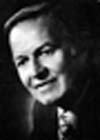
Lionel Van Deerlin |
Farewell to two dear friends |
 Mike Gotch Mike Gotch |
Editor's Note: Former State Assemblyman Howard Wayne voices the feelings of many fellow members of the San Diego Jewish community in mourning the passing of two Gentile friends: former Congressman Lionel Van Deerlin and Mike Gotch.
By Howard Wayne
 SAN DIEGO—In the course of a weekend San Diego, and San Diego Democrats in particular, lost two of their stalwarts, former Congressman Lionel Van Deerlin and former Assembly Member/Council Member Mike Gotch. Both touched my life. SAN DIEGO—In the course of a weekend San Diego, and San Diego Democrats in particular, lost two of their stalwarts, former Congressman Lionel Van Deerlin and former Assembly Member/Council Member Mike Gotch. Both touched my life.
While I was growing up in San Diego my family watched Lionel Van Deerlin, then a television news anchor, on the fuzzy pictures we would get from XETV, Channel 6 broadcasting from Tijuana. In 1962 Van Deerlin ran for Congress for the third time, in a newly created district in the south county. He beat a conservative Democrat in the primary and then prevailed in a tightly fought race over the brother of then-Congressman Bob Wilson. I was in high school and watched as the late-counted votes came in that upheld Van Deerlin’s margin of victory.
A few years later I was the president of the Young Democrats at San Diego State and invited Van Deerlin to speak on campus. He accepted and gave a great speech. With a few other club members I went out campaigning with him. We set up in front of a market and the manager tried to chase us away. Van pretty much dared him to call the police on a sitting member of Congress. That didn’t happen and afterwards we all went out to celebrate. Over burgers and fries Van Deerlin listened to what we college kids had to say.
I doubt that Van Deerlin remembered me from that time, but what drew us together was the city council candidacy of one of his aides, Rudy Murillo. Through that campaign I got to know Van Deerlin and members of his family. One of Van’s daughters, Vicky, came out for me at the caucus as I successfully campaigned to become a delegate to the Democratic National Convention. Rudy didn’t win his council race, but he was far more disheartened when Van Deerlin lost his reelection bid the following year. As Van said, he had too many easy reelections before that loss. I’ve never forgotten that.
Van returned to San Diego and began the popular newspaper column he authored for the San Diego Union. He could write whatever he wanted, and it was what we wanted to read. He was a guest at my wedding reception. In 1995 he helped me launch my Assembly race by speaking at my birthday fund raiser. It was such an honor to be supported by someone whom I had admired for so long.
I helped return the compliment. In 2005 I was on the San Diego County Democratic Central Committee and successfully urged the Committee to use its annual dinner to honor Van and his years of accomplishments. He was 90 and we knew the accolades were very much overdue. Van autographed my program from the dinner.
Lionel Van Deerlin was of my parents’ generation but Mike Gotch was of mine. We had each become active at about the same time in our respective communities; Mike in Mission Bay while I working with the Clairemont Town Council. But Mike Gotch made the first jump into the public arena, running for City Council in 1979 and I was pleased to support him. He won by a whisker over a scandal-tainted opponent - by less than 200 votes in the citywide run off election. Nine years later when I was stumping for district elections of the San Diego City Council, his win was cited to me as showing that an underfinanced Democrat could win an at-large election. Sure, if the opponent was caught in a scandal, and then just barely.
Around 1985 Mike Gotch and I shared a train ride to Los Angeles, during which I lobbied him to run for mayor of San Diego since Roger Hedgecock was about to be forced out of office. I offered to be his treasurer, a role I had taken in a number of other campaigns. I wish he had yielded to my importuning; San Diego would have been a better city.
Instead we became rivals in the1990 special election to fill out the unexpired term of Lucy Killea in the State Assembly. When Mike prevailed, I endorsed him, raised money for him, and walked precincts. He lost the runoff but came back to win the full term in November 1990 -again by a whisker. This time it was the Republicans who were coasting and Mike played possum long enough to give them a false sense of security.
Mike served two terms in the Assembly and became the vice-chair of the Local Government Committee. But shortly after his reelection he announced he was moving to Napa, and the following year he declined to run for reelection. So it looked like he was through with politics.
In 1996 I was elected to the Assembly and in 1998 Gray Davis was elected governor. Gray chose Mike to be his legislative director. I worked with Mike to formulate bills and lobbied him to convince Governor Davis to sign the bills I authored. It was a great partnership for San Diego. But then I hit term limits in 2002 and left the Legislature. The following year Mike left the governor’s office and then Governor Davis was recalled.
I didn’t see or talk to Mike Gotch much after that. I was in Borrego Springs this past March and knew that he had relocated there. His name and phone number were in the paperback size phone book for that community, but press of business kept me from calling. Such are our regrets.


ADVENTURES IN SAN DIEGO JEWISH HISTORY
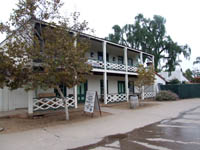
Robinson-Rose House
|
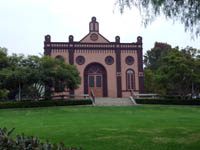
Old Temple Beth Israel |
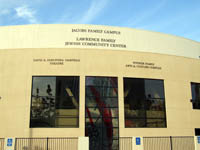
Lawrence Family JCC |
Editor's Note: We are reprinting news articles that appeared in back issues of various San Diego Jewish newspapers. You may access an index of the headlines of those articles by clicking here. You may also use the Google search program on our home page or on the headline index page to search for keywords or names.
Community Currents
From Southwestern Jewish Press, September 22, 1950, page 2
By Albert Hutler, Executive Director, United Jewish Fund
Oakland Builds for Better Living—One of the things that is most confusing in San Diego is the conflict between those forces who feel that more money should be spent locally, and those who show no interest in the local community at all. This is also a problem nationally. However, it's been solved in Oakland, California, where out of approximately $350,000 raised in the 1950 campaign, $181,000 has been allocated for needs for Oakland and its surrounding area. Oakland has just broken ground for a new Old Folks Home under the leadership of the Oakland Jewish Federation, and has just built a new Jewish Community Center. You'd almost begin to believe that with that kind of thinking, Oakland was in the Eastern part of the United States.
Funds To Be Distributed—United Jewish Fund Allocation Committee will begin distributing the funds, which were raised in 1950 in the campaign. The job this year should be a lot easier than in the past, since much of the work was done before the campaign started. The problem will be to distribute money in the percentage categories as outlined by the Pre-Campaign Allocations Committee. More than 85 percent of the net monies raised will go to Israel and Overseas; the balance will be distributed between local needs and national agencies, and institutions. The real problem is going to be how to distribute the same amount to each of the agencies and to the United Jewish Appeal when the campaign is now approximately 11 percent behind last year. Sol Price, chairman of the committee, and his very able members, will wrestle with this to a successful conclusion. Certainly everyon won't be satisfied, but we're all sure that the best job possible will be done.
Community Chest Needs Your Help—Conscientious citizens of the local community will soon be engaged in the Community Chest Campaign, which will open in late October. All of us are pleased with the recognition given to Irving Friedman as special gifts chairman, Eli Levenson, who will chair the speakers committee for the Community Chest drive, Mrs. Al Newman, who will be one of the district leaders, and Ed Breitbard. Workers will be needed and it is suggested that everyone who has the time, ought to pitch in and help in this great effort for San Diego's philanthropic agencies, of which the Jewish Welfare Society is one.
Community Centers Growing—Fifty-nine Jewish Community Centers in 55 communities in 24 states embarked on building programs involving the erection of brand new structures, of the remodeling of existing facilities, with the total estimated cost of $12,000,000 during the year dended August 31, 1950. San Diego ought to take notice that a community the size of Sioux City, Iowa, has just built a new beautiful Community Center, with the assistance of the local Rabbis.
{Return to top}

Nancy Harrison
cruise & tour specialist
(619) 265-0808

SAN DIEGO JEWISH WORLD THE WEEK IN REVIEW
Donald H. Harrison in San Diego: Reelect San Diego Mayor Jerry Sanders
Eran Lerman in Jerusalem: 'Peres' Planet': Electric cars, Arab-Israeli cooperation, new cities in the Arava
Hal Wingard in San Diego: His songs "Adira Hee," "Lech L'cha," and "Mitzvah Soup"
Adventures in San Diego Jewish History: What was the Jewish community news in 1950? Who were the newsmakers? Our archives answer these questions in daily installments
Donald H. Harrison in San Diego: Protecting America's 'House of Pluralism'
Evelyn Kooperman in San Diego: San Diego Jewish Trivia: Balboa Park
Adventures in San Diego Jewish History: What was the Jewish community news in 1950? Who were the newsmakers? Our archives answer these questions in daily installments
Shoshana Bryen in Washington, D.C—President Bush in Mideast made us kvell
Donald H. Harrison in San Diego: Marti, Marty: Candidates giving us nachas
J. Zel Lurie in Delray Beach, Florida: What we imagine the Bush and Olmert families 'really' said to each other
Dorothea Shefer-Vanson in Mevasseret Zion, Israel: From would-be English grl to Zionist
Eileen Wingard in San Diego: 'Blue' songs detract from Jewish anthology
Adventures in San Diego Jewish History: What was the Jewish community news in 1950? Who were the newsmakers? Our archives answer these questions in daily installmentsDonald H. Harrison in San Diego: Diplomacy, art and food were mainstays of Israel festival at Lawrence Family JCC
Dov Burt Levy in Salem, Massachusetts: Sabbatical shalom: No, it's not a misspelling
Sheila Orysiek in San Diego: A life story contained in six boxes
Adventures in San Diego Jewish History: What was the Jewish community news in 1950? Who were the newsmakers? Our archives answer these questions in daily installments
Donald H. Harrison in San Diego: Night on Churchill—er, Dizengoff—filled
with new sights and shoulder movements
Natasha Josefowitz in La Jolla, California: What to do with those old family photos
Rabbi Baruch Lederman in San Diego: The Rosh Yeshiva and a Hebrew Christian; story by Yair Hoffman
Rabbi Leonard Rosenthal in San Diego: Starting Jewish studies even as an adult
Ira Sharkansky in Jerusalem: Retaliation in Gaza may be a matter of political timing after Bush, Pelosi visits
Adventures in San Diego Jewish History: What was the Jewish community news in 1950? Who were the newsmakers? Our archives answer these questions in daily installments
Link to previous editions
< BACK TO TOP
|
